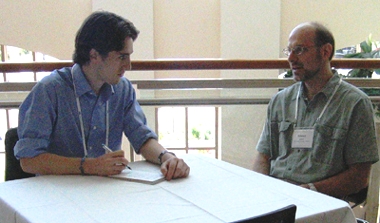As science reporting falls, scientists must rise
I attended a panel last week, titled “The Future of Science and Environmental Journalism,” that included Peter Dykstra, former executive producer for CNN’s Science, Technology and Weather unit. Peter and his entire science team were cut from CNN in December, marking one of the largest blows for science reporting in the mainstream media. The panel discussed the abysmal state of affairs for science journalism, especially when menacing global issues like climate change and invasive species pose such a threat to society at large.
As the New York Times’ Andrew Revkin pointed out in his blog, it’s easy to blame waist-tightening business managers for the lack of competent news coverage of science. But in fact, it may have to do with the way we teach science and engineering, both in and out of the classroom.
At a session at the annual meeting of the American Association for the Advancement of Science (AAAS) this weekend, the perilous state of science news coverage was debated in the session “Hot and Hotter: Media Coverage of Climate-Change Impacts, Policies, and Politics.” Stephen Schneider, a climatologist and contributing author to the 2007 IPCC report, gave an outspoken rebuke to both business managers and his scientific colleagues.
“Business managers of media organizations, you are screwing up your responsibility by firing science and environment reporters who are frankly the only ones competent to do this,” he said in a news release from Stanford’s news office. And he didn’t stop there.
Schneider pointed out that many scientists find it irresponsible to spend a lot of time talking with the media when they only get “5 seconds on the evening news, a couple of quotes in the New York Times, or five minutes in front of Congress.”
“Well, you know what guys [sic], that’s just how it is,” he said. “And if you think that you have a higher calling and you’re not going to play the game because they don’t give you the time to tell the whole story, then all it means is that you’ve passed the buck to others who know the topic less well.”
In a time when educated, knowledgeable science reporters are being let go left and right, the duty of communication falls ever more strongly to scientists. Otherwise, we risk misinformed science news coverage – like this infamous FOX News story about using water as fuel – with no background check for credibility.
Read more about Stephen Schneider’s excellent advice for scientists communicating with the media on his “Mediarology” web page.
Photo: Milwaukee Journal-Sentinel reporter Elie Dolgin interviews ecologist Edward Levri of Penn State Altoona during the 2008 ESA annual meeting
